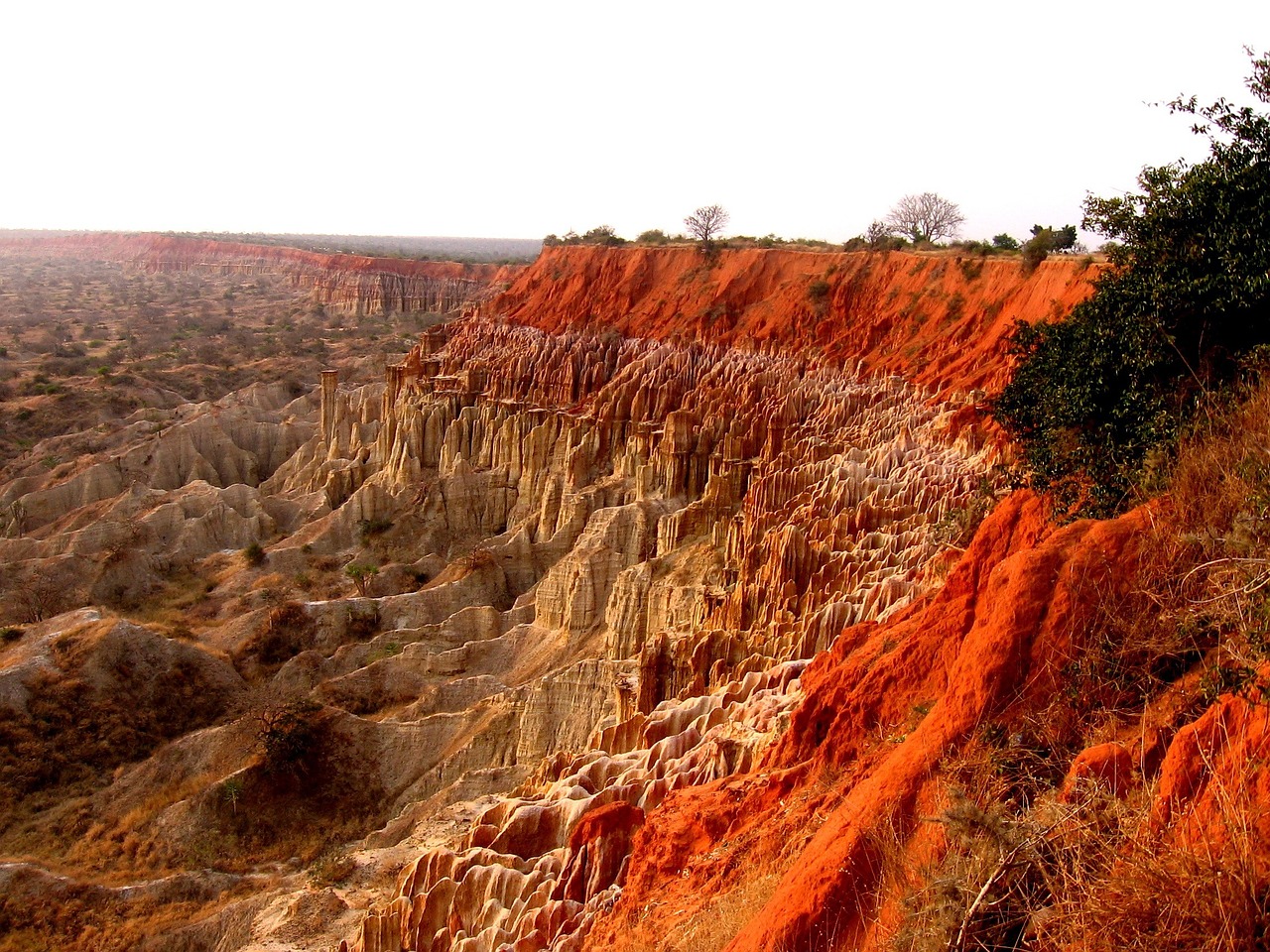Angola / República de Angola – Let’s explore here
What’s it like in Angola?
Angola is a beautiful country on the western coast in southern Africa, about twice the size of France. The terrain consists of a desert-like coastal plain, with hills and mountains running parallel to the coast, and a large plateau to the east of the country. The highest point is Mount Moco, in the Serra da Leba mountain range in western Angola, at 8,600 ft (2,620 m) above sea levl.
There is also a contested enclave of Angola, on the coast to the north of Angola, called Cabinda. It is surrounded by the Democratic Republic of Congo to the south and the Republic of Congo to the north. There are vast oil field just off the coast of Cabinda.
Angola has a very long, rich and troubled history, resulting in poor livening standards and low life expectancy for the majority. It relies heavily on its reserves of diamonds, oil, gold and copper.
The country has a population of around 37 million (2023), about ¼ of whom live in the metropolitan area of the capital, Luanda. It shares land borders with Namibia, Zambia and the Democratic Republic of the Congo.

A bit about the history of Angola
Pre Colonial History
Angola’s history dates back to ancient times, with early inhabitants including various Bantu-speaking peoples. Several powerful kingdoms and empires developed in the region, such as the Kingdom of Kongo (in the northwest), the Ndongo Kingdom and the Kingdom of Matamba. These societies were known for their complex political structures, trade networks and cultural achievements. The region was also part of the transatlantic slave trade, with many people being taken as slaves to the Americas.
Portuguese Colonisation
In the late 15th century, Portuguese explorers, led by Diogo Cão, arrived in the region and began establishing trade links. By the late 16th century, the Portuguese had established forts and trading posts along the coast, particularly around Luanda, the capital of Angola. Portuguese settlers and traders took control of much of the coastal area, but the interior regions remained under the control of indigenous kingdoms. Over time, Portugal expanded its control through military force, alliances and the establishment of settlements.
Slave Trade and Economic Exploitation
During the 17th and 18th centuries, Angola became one of the primary sources of slaves for the Americas, particularly Brazil. The Portuguese established a system of slave trading, which devastated local populations and disrupted traditional societies. Portugal also began exploiting Angola’s resources, such as ivory and later, diamonds, while the majority of the local population was forced into labour or subjected to oppressive colonial policies.
Struggle for Independence
The 20th century saw growing discontent among Angolans due to the harshness of Portuguese colonial rule. Several nationalist movements emerged, such as the Popular Movement for the Liberation of Angola (MPLA), the National Front for the Liberation of Angola (FNLA), and the National Union for the Total Independence of Angola (UNITA). In the 1960s, armed resistance against Portuguese rule intensified, leading to the outbreak of the Angolan War of Independence in 1961.
The war lasted until 1974, when the Carnation Revolution in Portugal led to the fall of the Portuguese dictatorship and the end of colonial rule. In 1975, Angola officially gained its independence, but the country was immediately plunged into a civil war between the MPLA, which was supported by the Soviet Union and Cuba, and UNITA, which was backed by the United States and South Africa.
Civil War and Foreign Intervention
The Angolan Civil War, which lasted from 1975 until 2002, was one of Africa’s longest and most destructive conflicts. The war was marked by intense fighting, widespread displacement and significant loss of life. Both sides employed brutal tactics, and the war was further complicated by Cold War geopolitics, with the MPLA receiving support from socialist countries and UNITA from Western and apartheid-era South African forces. The war caused widespread devastation, and the economy of Angola was severely damaged.
Post War Reconstruction
In 2002, the death of UNITA leader Jonas Savimbi and the signing of a peace agreement brought an end to the civil war. Since then, Angola has focused on rebuilding its economy and infrastructure. Oil and diamonds have been central to the country’s economic recovery, and Angola has seen significant economic growth. However, the wealth has been unevenly distributed, and the country still faces challenges related to poverty, corruption and political stability.
Modern Angola
Angola is currently a one-party republic, with the MPLA remaining in power since independence. The country has made significant progress in infrastructure development, particularly in Luanda, and the oil industry continues to be the backbone of the economy. Despite these advancements, Angola still grapples with social inequality, unemployment, and a lack of adequate public services, particularly in rural areas. The country continues to work towards consolidating peace, improving governance, and fostering economic diversification. Political reforms have been made, but the MPLA’s long-standing dominance in the political system remains a point of contention for opposition groups.

Angola road trip
Our Angolan road trip is part of a much larger African road trip. Our current planned road trip though Angola takes us from the Republic of Congo into Cabin, an exclave of Angola, before raversing the short stretch of DRC into Angola proper. The route will take us via the capital, Luanda, before heading south along the coast, and then inland via Lubango and onto Namibia.
Hopefully our journey will improve our knowledge of this intriguing and beautiful country, and enable us to meet some interesting people. We’ll be updating this page at that time – don’t forget to check back 🙂
Map of our road trip through Angola

What’s it like to drive in Angola?
They drive on the right hand side of the road in Angola. In the main, roads are very poor, with many being unsurfaced dirt tracks. Driving standards are also poor.
Do you require an international driving permit in Angola?
We’ve created a dedicated page to driving abroad, which answers this question, and more, which you might find helpful.
Can you use your UK driving license when driving through Angola?
We’ve created a dedicated page to driving abroad, which answers this question, and more, which you might find helpful.
Do I need a carnet de passages to drive in Angola?
We’ve created a dedicated page to driving abroad, which answers this question, and more, which you might find helpful.
What is the weather like in Angola?
The rainy season in Angola is from mid September to April. The dry season is from May to August. The best time to visit is between mid May and August. The worst months are March and April.
What currency do they use in Angola?
In Angola they use the Kwanza. Cash is widely used. The use of credit / debit cards is not widely accepted. Traveller’s cheques are not readily accepted. There are some ATMs in cities throughout the country.
You should make yourself aware of the amount that your bank charges you for using credit and debit cards abroad. Often credit cards are cheaper for purchasing items directly, and for withdrawing cash from ATMs.
What language do they speak in Angola?
They speak Portuguese in Angola. At the borders with DRC and Congo, people also speak French. English is becoming more widely spoken among the younger generations.
What time zone is Angola in?
Remember, when you’re planning your next trip to take a look at what time zone it’s in.
Do I need a visa to visit Angola?
We’ve created a dedicated, more comprehensive page on visas, which you should find helpful. Check it out!
Is wild camping legal in Angola?
Yes, wild camping is fine in Angola.
What plug / socket type do they use in Angola?

In Angola they use plug / socket type C.
Health issues in Angola
Is it safe to drink water in Angola?
No, it is not safe to drink tap water in Angola. Bottled water is readily available throughout the country.
What vaccinations are required for Angola?
This NHS website is kept up to date with all relevant information on vaccinations in Angola.
Phones in Angola
What is the country calling code for Angola?
The country calling code for Angola is +244
What are the emergency phone numbers in Angola?
- The emergency number for police in Angola is: 113
- In Angola, the emergency number for ambulance is: 112 / 116
- The emergency number for fire in Angola is: 115
If you’ve got some useful info that you’d like to share, let us know!
And don’t forget to check out all the other pictures!
